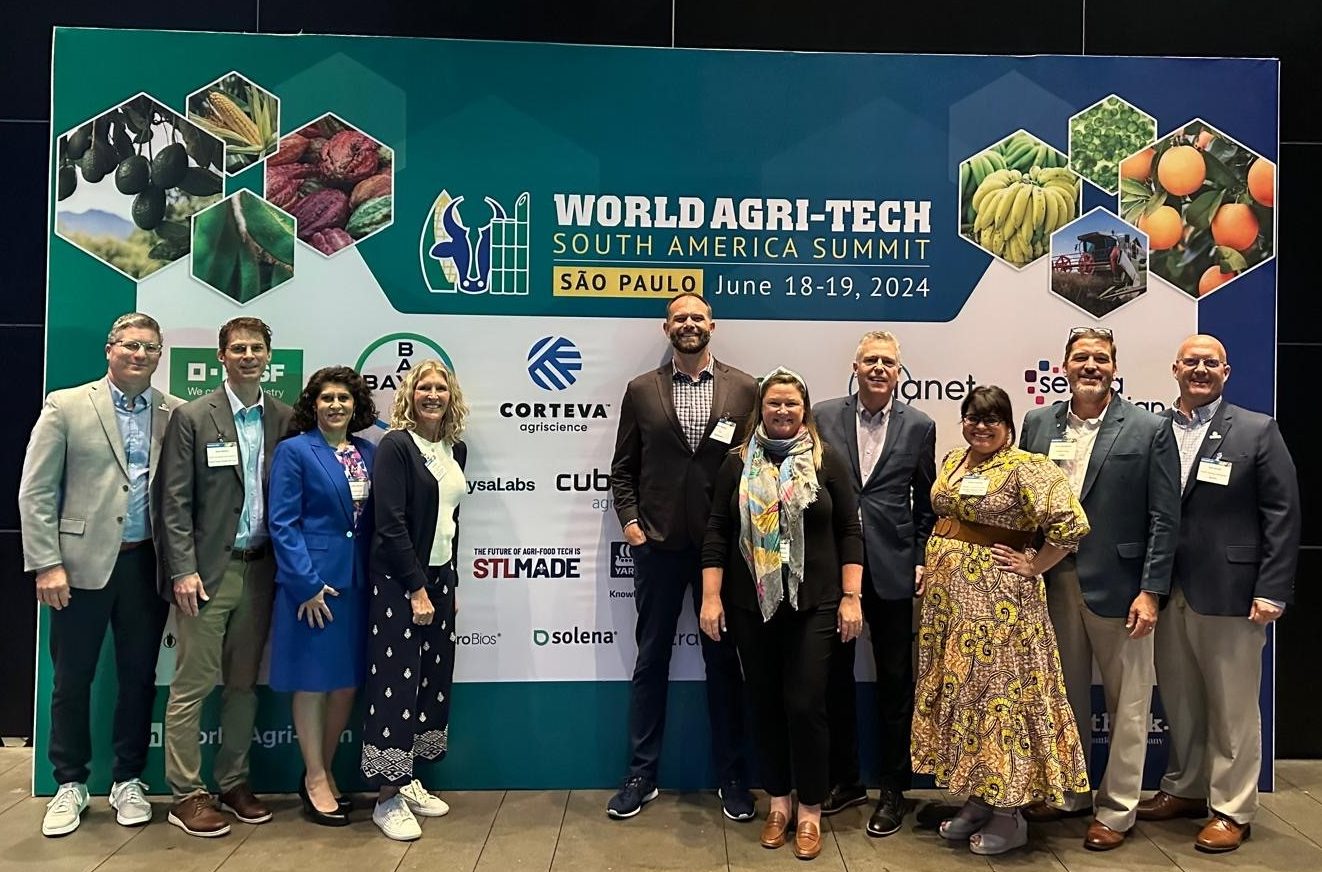The Importance of Global Connections: A visit to Brazil

Sean Mullins discusses his experiences at World Agri-Tech South America Summit
Last month, Sean Mullins, director of foreign direct investment for World Trade Center St. Louis (WTC), traveled to Brazil as part of a delegation focused on building awareness of St. Louis in the agtech innovation space. At the World Agri-Tech South America Summit in São Paulo, the delegation worked to promote St. Louis as a connecting bridge between Latin American and North American agrifood-tech innovation and strengthen existing relationships.
Below is an interview with Mullins about his visit.
What was the purpose of the trip?
As called for in our metro St. Louis Foreign Direct Investment (FDI) plan, the World Trade Center St. Louis has for many years fostered agtech and foodtech relationships internationally, particularly with Latin America. Last year, through the strong leadership of the Danforth Plant Science Center and other support organizations including WTC, BioSTL, the Yield Lab, Greater St. Louis, Inc. and 39 North, we created the Cultivar STL initiative to strengthen those relationships further in order to enhance mutual economic growth and address food security. Cultivar STL enhances our connections economically, through trade and investment, with a particular focus on what St. Louis and Missouri does extremely well – agtech. Increasingly, agtech interests have merged with geospatial interests and our visit to Brazil sought to explore Latin American agtech and geospatial offerings.
Who took part in the visit and who did you meet with?
The St. Louis group consisted of the Danforth Plant Science Center, Taylor Geospatial Institute, T-REX and BioSTL. The CEO of HabiTerre also joined us. Our primary purpose was to attend the World Agri-Tech South American Summit. There were about 700 South American and international people who attended the Summit and shared information about themselves and trends in the region. We met with startups, small companies, large companies and venture funds. We also visited Cubo Itaú, a non-profit organization that is a coworking space for startups and has a special agtech initiative called Cubo Agro.
During the last few days of our trip, we traveled to São José dos Campos to see their Technological Innovation Park, which has a footprint of about 2 million square feet and serves around 300 companies. While there, we participated in another agtech conference, Agriculture of the Future (O Agro Do Futuro), a discussion with experts from major market players in Latin and North America and held our own Cultivar panel conversations too. We also toured Visiona, which is a joint venture between Embraer Defense & Security and Telebras focused on the integration of space systems and satellite-based services.
What was the biggest takeaway you received from your visit?
There is considerable agtech development happening in Latin America. In particular, I learned the scale of Brazil’s soybean production and its dominance in soybean exports. Brazil has substantial economies of scale with their family-owned mega farms that are generally larger in both acreage and labor than their counterpart farms in the U.S. It’s vital for St. Louis to be attentive to the players and companies there as South America is a major producer of crops feeding the world. Latin America is a place of potential buyers for St. Louis agtech products and services, and we also could benefit from their innovations in agricultural production too.
How did this visit impact you and STL at large?
St. Louis and Missouri are global leaders in agtech. Missouri has around 90,000 farms and Missouri agriculture is a $94 billion industry with a workforce of more than 456,000 people. Large amounts of agricultural product are shipped via river barge from the St. Louis region so much so that a 15-mile section of the Mississippi is known as the “Ag Coast of America.” However, staying competitive and globally relevant requires constant awareness of ways to improve production. Reducing inputs and improving yields mean increasing digitization is essential for the industry in the future. Innovation is happening worldwide with technologies such as artificial intelligence, drones, blockchain, and geospatial. Seeing the need, talent and tech availability, particularly in Latin American, compels me to spread the message of the high value of international relationships to efficiently improve agricultural production and build resilience in our respective economies.
Why was this visit important for the World Trade Center?
The WTC, with regional partners, spent a great deal of time and energy with the Brookings Institution in 2016 developing the first ever metro St. Louis FDI plan. The plan had a special emphasis on agtech as the industry sector in St. Louis with a high amount of appeal for international investment. WTC, along with strong support from our regional partners, helped maintain and drive awareness among Latin American agricultural companies contemplating where in the world they can find strong agtech partners, and that St. Louis and Missouri should be on the top of their list!
What are the next steps after this visit?
On the closing day of the World Agri-Tech South America Summit, the Danforth Center, BioSTL and The Yield Lab LATAM signed a memorandum of understanding (MOU) as part of Cultivar STL. The MOU defines key activities:
- Linking startups and corporate partners for potential business development connections
- Promoting early-adopter farmer/grower exchanges and learning opportunities
- Strengthening the curated support for emerging companies looking to do business across geographies
- Promoting ecosystem learning, sharing and capacity building, including delegations/visits between geographies
WTC is ready to assist in all these activities, particularly with supporting companies looking to do business across geographies and helping with delegations/visits between geographies. Mullins and the delegation will continue to build awareness of St. Louis in South America’s agtech innovation space by visiting Argentina in August.
Contact Sean Mullins for more information:
